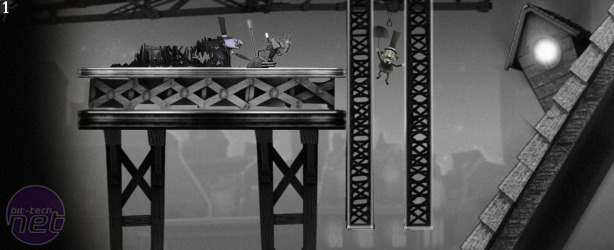The Misadventures of PB Winterbottom Review
April 24, 2010 | 09:26

Numb-bum
Gameplay-wise, Winterbottom draws immediate and fairly accurate comparisons to the more well-known and arty Braid. Both games focus on fusing classic platformer action with brain-breakingly complex puzzles that involve manipulating time. At first glance the main difference might only be that Braid has you running to collect jigsaw pieces, where Winterbottom is about grabbing pies.Truth be told though, while the pace and general mechanics are definitely similar, Winterbottom feels a lot more expressive. The abilities at your disposal for solving levels are fewer than in Braid, but puzzles in Winterbottom often have more than one possible solution. That makes it feel a lot more fair, even if it does mean that the gameplay lacks the focus of Braid’s carefully plotted conundrums.
Winterbottom’s main power is the ability to create clones of himself by recording his own actions. If you run around for a bit while holding left shift, then let go, you’ll spawn a ghostly clone who’ll repeat that loop until you either disable him or he’s interrupted – at which point he gets disorientated and will just stand still, looking baffled.
Clones can do everything you can, naturally, and you can make record loops as long as you want – the only limit is on how many of them you can have in each level. Easier levels will only require one or two clones to complete, while the later stages start to introduce multiple clones as well as portals that have unique effects or which place limitations on your abilities.
Either way, collecting all the pies in a level requires you to make clever use of your twins, generally by whacking them with your umbrella, riding on their ethereal shoulders or setting up clever routes through the level. Most levels require the pies to be picked up in a certain order too, presumably in order of increasing sweetness.
Again like Braid, Winterbottom uses an inter-level hub which lets you replay through previously completed levels in an attempt to better your time. There’s an online leaderboard that you can use to compare your times to other players too, as well as a full set of Steamwork features – achievements, Steam Cloud, the works.
Replay value for a puzzle game like this is obviously pretty limited as, once you’ve solved a level, there’s really very little incentive to go back and try it again. Achievements and leaderboards make a tempting enticement, but very few people are likely to get truly competitive about Winterbottom’s core campaign. Still, for those that do like constantly refining their paths and shaving seconds off their speedruns, Winterbottom includes a ‘Bonus Shorts’ section that challenges you to complete levels as fast and with as few clones as possible.

It’s worth taking note of the low price too. At just £3.99 Winterbottom represents great value for money even if you never replay it after your first go with it.
Winterbottom isn’t a perfect game and it suffers a bit from arriving long after the likes of Braid and Portal. The controls feel the tiniest bit awkward too, while the presentation and poetry lose their sheen the further into the game you delve; by the time you reach the last levels you’ll likely be dying for a bit more colour and a bit less rhyming. Still, the price is low enough to make these quibbles pretty much a non-issue and there’s no denying that the puzzles are gloriously insidious and suitably taxing. If you’ve got a platform-puzzler itch and need it scratched quickly then Winterbottom is the man to see.
Score Guide

MSI MPG Velox 100R Chassis Review
October 14 2021 | 15:04











Want to comment? Please log in.